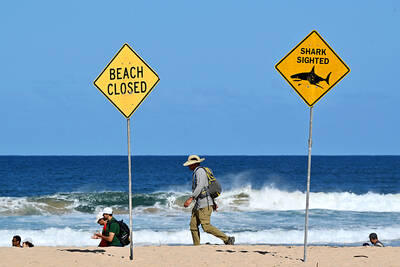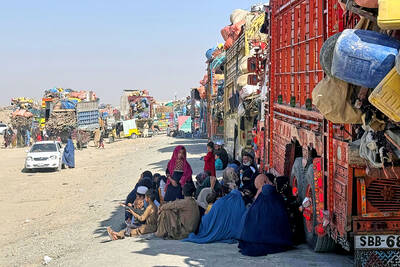A two-week conference aimed at ensuring the survival of global biodiversity in the face of climate change and pollution got under way in Germany yesterday.
The protection of flora, fauna and even food sources will be on the agenda of the 191 governments attending the ninth conference of the UN Convention on Biological Diversity in Bonn.
Officials will also review the goals set in 2002 at the UN.
Earth Summit, which called for slowing the loss of biological diversity by 2010 — a target that critics contend is far out of reach given a growing human population, rising levels of pollution and climate change.
Organizers also hope the conference will help find new ways to ease the rapid rise in food costs, which has sparked violent protests in Haiti and Egypt. There is also concern that unrest could take place elsewhere amid profiteering and hoarding.
Food prices have been driven to record highs recently by a variety of factors, including a spike in the cost of petroleum products, including those used in fertilizers and processing.
There has also been an increase in the price of grain, which is used to produce biofuels and given as food to livestock to satisfy a growing demand for meat in developing countries. The price of rice has more than tripled since January.
“Renewing agricultural diversity of crops and livestock backed by a functional natural support system is the international community’s best long-term solution to meet the global food challenge,” Ahmed Djoghlaf, the executive secretary of the Convention on Biological Diversity, said before the conference.
He said that while the meeting would focus on a number of issues, including global deforestation and slumping wildlife populations, the fact that prices for wheat, corn and rice are at record highs while food stocks are at historic lows provides a dismal backdrop.
“Agriculture is considered a prime example of how human activities profoundly impact the ecological functioning of the planet,” Djoghlaf said in a statement. “During the past 50 years, humans have altered ecosystems more rapidly and extensively than in any other period in human history. Indeed, more land was converted to cropland during the last 50 years than in the previous two centuries.”
The financial losses of distinct land and species has been projected to be approximately 2 trillion euros (US$3.1 trillion), or about 6 percent of the entire world’s GNP, German weekly Der Spiegel reported yesterday.
Among strategies to crimp those losses is to refocus on reforestation worldwide. German Chancellor Angela Merkel is expected to increase her country’s funding to augment those efforts.
German Environmental Minister Sigmar Gabriel told lawmakers earlier this month that the loss of biodiversity signaled a severe economic threat that was on par with climate change.
He said that “effective measures” had to emerge from the Bonn meeting if real progress was to be made.

With much pomp and circumstance, Cairo is today to inaugurate the long-awaited Grand Egyptian Museum (GEM), widely presented as the crowning jewel on authorities’ efforts to overhaul the country’s vital tourism industry. With a panoramic view of the Giza pyramids plateau, the museum houses thousands of artifacts spanning more than 5,000 years of Egyptian antiquity at a whopping cost of more than US$1 billion. More than two decades in the making, the ultra-modern museum anticipates 5 million visitors annually, with never-before-seen relics on display. In the run-up to the grand opening, Egyptian media and official statements have hailed the “historic moment,” describing the

SECRETIVE SECT: Tetsuya Yamagami was said to have held a grudge against the Unification Church for bankrupting his family after his mother donated about ¥100m The gunman accused of killing former Japanese prime minister Shinzo Abe yesterday pleaded guilty, three years after the assassination in broad daylight shocked the world. The slaying forced a reckoning in a nation with little experience of gun violence, and ignited scrutiny of alleged ties between prominent conservative lawmakers and a secretive sect, the Unification Church. “Everything is true,” Tetsuya Yamagami said at a court in the western city of Nara, admitting to murdering the nation’s longest-serving leader in July 2022. The 45-year-old was led into the room by four security officials. When the judge asked him to state his name, Yamagami, who

DEADLY PREDATORS: In New South Wales, smart drumlines — anchored buoys with baited hooks — send an alert when a shark bites, allowing the sharks to be tagged High above Sydney’s beaches, drones seek one of the world’s deadliest predators, scanning for the flick of a tail, the swish of a fin or a shadow slipping through the swell. Australia’s oceans are teeming with sharks, with great whites topping the list of species that might fatally chomp a human. Undeterred, Australians flock to the sea in huge numbers — with a survey last year showing that nearly two-thirds of the population made a total of 650 million coastal visits in a single year. Many beach lovers accept the risks. When a shark killed surfer Mercury Psillakis off a northern Sydney beach last

‘NO WORKABLE SOLUTION’: An official said Pakistan engaged in the spirit of peace, but Kabul continued its ‘unabated support to terrorists opposed to Pakistan’ Pakistan yesterday said that negotiations for a lasting truce with Afghanistan had “failed to bring about a workable solution,” warning that it would take steps to protect its people. Pakistan and Afghanistan have been holding negotiations in Istanbul, Turkey, aimed at securing peace after the South Asian neighbors’ deadliest border clashes in years. The violence, which killed more than 70 people and wounded hundreds, erupted following explosions in Kabul on Oct. 9 that the Taliban authorities blamed on Pakistan. “Regrettably, the Afghan side gave no assurances, kept deviating from the core issue and resorted to blame game, deflection and ruses,” Pakistani Minister of